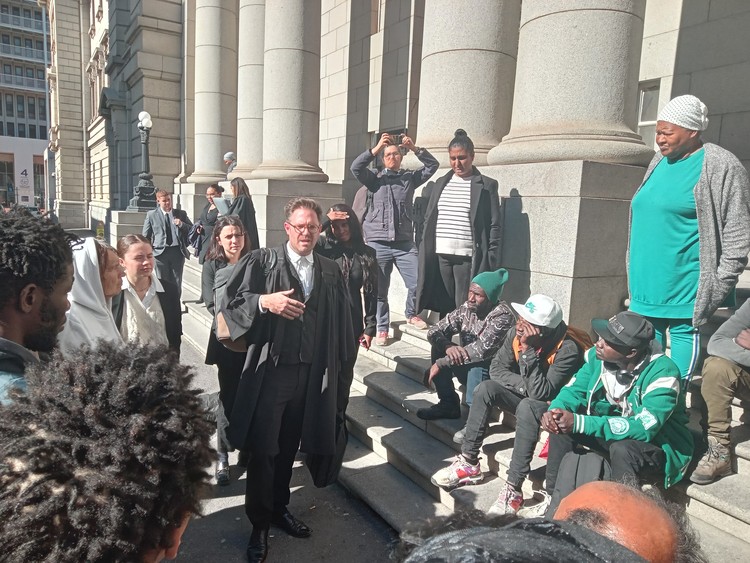Court criticises PRASA for illegal evictions
Ndifuna Ukwazi’s urgent application for interdict on behalf of Foreshore land occupiers continues
Outside the Western Cape High Court, Ndifuna Ukwazi attorney Jonty Cogger speaks to applicants urgently seeking an interdict preventing PRASA from evicting them from land they have occupied for years. Photo: Sandiso Phaliso
- Last week, PRASA attempted to evict people who for years have been living on a patch of Transnet-owned land.
- It appears PRASA had not obtained the necessary court order to do so, and the eviction was thus illegal.
- An application for an urgent interdict preventing PRASA from further eviction attempts without a court order, was heard in the Western Cape High Court on Thursday.
- The hearing continues on Friday.
Judge Tandazwa Nditha criticised the Passenger Rail Agency of South Africa (PRASA) in the Western Cape High Court on Thursday. This followed PRASA’s attempt last week to evict people from land some of them had lived on for more than a decade.
“No one should be evicted without a court order,” said Judge Ndita, in hearing the urgent application for an interdict against the eviction.
The application was brought by housing activist organisation Ndifuna Ukwazi on behalf of 38 people who had been living on the land along Old Marine Drive on the Cape Town Foreshore.
Ndifuna Ukwazi attorney Jonty Cogger argued the eviction, which took place on 19 and 22 August, was unlawful, and relief was sought to prevent PRASA from conducting an eviction without a court order. Cogger also argued the building materials PRASA had confiscated from the land occupiers should be returned.
He argued that as a result of the “unlawful” eviction, the applicants had been having to live outside in extreme winter conditions.
He argued that if PRASA was not able to return the applicants’ materials, they should be liable for the cost of restoring the property and building materials within 24 hours.
During PRASA’s second attempt to evict the land occupiers on 22 August, 64-year-old Ally Al-Hasby, who lives on the property with his wife and three children, was stabbed in the shoulder. Video footage of the incident shows he was likely stabbed by PRASA security.
During the hearing on Thursday Judge Ndita said she was unable to rule on the matter as PRASA had failed to file answering affidavits. She urged Cogger and PRASA to meet urgently and find an amicable solution.
Cogger said he emailed correspondence to PRASA on 26 August and made phone calls, but he had received no response.
PRASA’s attorney Mukhethwa Nthambeleni told the court the eviction was a joint operation between PRASA, the City of Cape Town, and SAPS. Nthambeleni said he didn’t have time to draw up an answering affidavit because he only received instructions to do so on 27 August.
He said the land occupiers’ building materials were not in PRASA’s possession.
“My client confirmed they are not in possession of the goods. My client is cited here alone, and it is difficult for the court to determine without all the role players,” he said.
Judge Ndita said the hearing would continue on Friday to give PRASA an opportunity to file their answering affidavit.
She reiterated it was unlawful for anyone to be evicted without a court order.
However, she said she could not give an order against a party that had not been heard. “That would be unconstitutional,” she said.
Support independent journalism
Donate using Payfast

Don't miss out on the latest news
We respect your privacy, and promise we won't spam you.
Next: Mamelodi residents threaten relocated flood victims
Previous: Hundreds march to Tshwane mayor’s office demanding debt write-off
© 2024 GroundUp. This article is licensed under a Creative Commons Attribution-NoDerivatives 4.0 International License.
You may republish this article, so long as you credit the authors and GroundUp, and do not change the text. Please include a link back to the original article.
We put an invisible pixel in the article so that we can count traffic to republishers. All analytics tools are solely on our servers. We do not give our logs to any third party. Logs are deleted after two weeks. We do not use any IP address identifying information except to count regional traffic. We are solely interested in counting hits, not tracking users. If you republish, please do not delete the invisible pixel.

